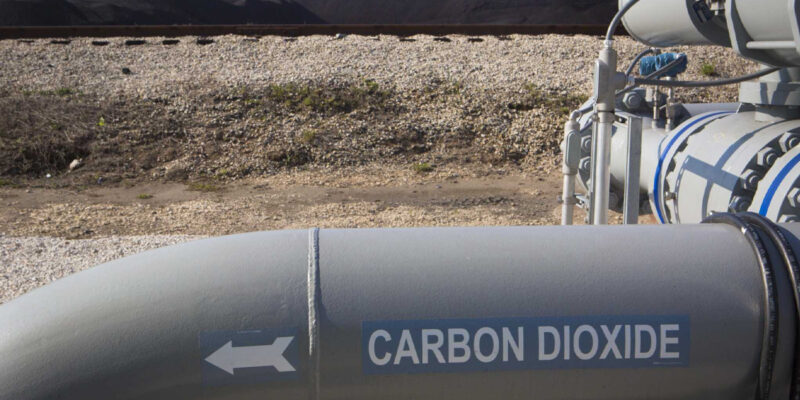Editor’s Note: This is Part 1 of a two-part series on carbon capture and sequestration by Louisiana Rep. Charles “Chuck” Owen (R-Leesville).
For months, we’ve been told that in order for Louisiana to remain competitive in the world market for oil and gas, we have to “comply” with the market demands for “low carbon” or “cleaner” energy production. I’ve asked some experts what that means, and the conversation usually drifts away from substance towards placations about what Europe wants to buy from us. I guess I could accept the answers, but my professional backgrounds in intelligence analysis and higher education drive me to go and look for sources and to see for myself if what I’ve been told can be validated. I’ve done my own digging and I can’t find any hard or even Jello-like evidence that this market demand is a near or even long term concern in the context that is being used to justify what we as a state are embracing. I think we owe it to each other to really look into this. Here goes.
One of Louisiana’s biggest businesses right now and our largest contributor to the world energy market is Liquified Natural Gas (LNG). For those unfamiliar, LNG is a product that comes from our enormous deposits of natural gas in different spots of our state. Natural gas is converted into a liquified form and then sold on the world market in all sorts of places.
Here’s the reality of the current LNG Market:
- In 2024, the US sold 90 million metric tons of LNG, with Europe (50%+), Japan (10%), and South Korea (8%) as top buyers. Europe depends on us for a lot of reasons for this gas, and one of them is tied to supply disruptions from Russia. Asia is working hard to find a new path away from a dependence on coal. Price and availability of our LNG on the world market is much more important right now than the academic and political fascination with managing emissions
- In researching this article, I can’t find where a major buyer has imposed a blanket requirement for carbon sequestration. Some contracts and agreements emphasize “low-carbon LNG,” but this is often achieved through methane leak reductions or carbon offsets, not mandatory burial captured carbon.
With this framework in mind, here’s what I can find on the “why” of permanent carbon sequestration, especially in Louisiana:
- CCS is mostly relevant for coal plants or industrial emitters, not LNG production. LNG facilities like Cheniere’s Sabine Pass or Cameron LNG emit CO2 during liquefaction (about 0.4 tons per ton of LNG), but capturing that and sequestering it isn’t standard practice across the industry yet.
- Upstream gas production (drilling, fracking, etc. associated with places like the Haynesville Shale) emits methane more than CO2, and world buyers care more about plugging those leaks because methane is a more potent greenhouse gas.
The driving force and motivation I’ve heard from people in the oil and gas industry is that markets in Europe “demand” we send them clean energy. As I have addressed in other articles, our production of natural gas is already just about the cleanest on earth and I don’t understand why we must go further down an almost impossible path of cleaning up something that is already clean. But I’ve been curious about the origin of these “mandates.” Here are some things to consider:
- Europe has been pushing something called Fit for 55 and the bewildering concept of net-zero by 2050, but it is not—REPEAT NOT—rejecting U.S. LNG because of our emissions. In 2024, in fact, Germany signed long-term deals with U.S. exporters and levied no CCS dictates. Japan and South Korea desire “carbon-neutral LNG” but they are focusing on real offsets—planting trees, and not burying CO2. Planting trees—who would’ve imagined? If you want us to plant trees, we know how do that in Louisiana! Something known as the European Union’s Carbon Border Adjustment Mechanism (CBAM) might eventually hit energy imports, but it’s years off and not LNG-specific at this time.
- It seems to me that someone is imagining a boogey-man that either doesn’t exist at all or is years away from even becoming a reality. Yes, I believe we should plan for the future, but there is NO world-wide market demand that should be driving us to burying carbon below our beautiful land. There might be a desire from academics or policy people, but the markets do not clamor for it from what I can see. So, this is an open challenge to anyone who can show it to me in writing that our energy industry is threatened by this at this point in time.
This “boogey-man” is causing significant consternation and unnecessary alarm in parts of Louisiana. The alarm from my citizens is tied to a number of issues and the public is deeply concerned.
So, the question becomes, why is there a push to sequester carbon? There are two possible answers: Money or ideology. We’ll cover those two in the next half of this piece.
Chuck Owen is a 2nd Term State Legislator, representing the 30th District of Louisiana (Beauregard and Vernon Parishes). He Chairs the House Select Committee on Military & Veteran Affairs, is Vice Chair of the Select Committee on Homeland Security, and is a member of on the Education, Appropriations and Municipal, Parochial and Cultural Affairs committees. Owen is a member of the Rural Caucus, the Central Louisiana Delegation, the Republican Delegation and is a founding member of the Louisiana Freedom Caucus. He is a retired Air Force intelligence officer with 4 wartime deployments. He resides in his hometown of Leesville and teaches at the collegiate level for four universities as an adjunct faculty member. He holds a Ph.D. from LSU and a BS and MBA from Louisiana Tech.
Advertisement
Advertisement

